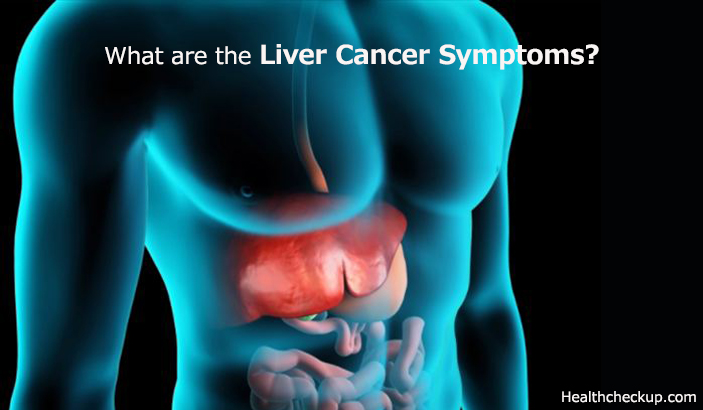Normally, cancer symptoms are not diagnosed at early stages, so is the same with liver cancer symptoms. Only when the cancer reaches the advanced stage, there will be more appearance of symptoms.
Actually there are no broadly suggested routine screening tests for liver cancer, hence individuals who have a family history of the disease or if suspect other risk factors must consult their doctor about measures they can consider to have a check or decrease the risk of developing liver cancer.
Liver Cancer Symptoms
Each person may exhibit cancer symptoms in a different way. Any one of the symptoms may be triggered by other, benign conditions.
Below are Few Common Liver Cancer Symptoms which Include:
- Weight loss which is not associated with diet changes
- Decrease in appetite (feeling of fullness even after a slight meal)
- Nausea
- Vomiting
- Persistent general weakness or fatigue
- Fever that is not related to other situations
- Right upper abdomen pain or near the right shoulder blade
- Hepatomegaly (enlarged liver) which is generally felt as a mass under the ribs on the right side
- Enlarged spleen, a feeling of a mass under the ribs on the left side
- Abdominal swelling (ascites) or bloating in the abdomen which can happen as a mass forms
- Jaundice, which seems as skin and eyes yellowing. Jaundice arises when the liver is not workingeffectively.
What are the Liver Cancer Symptoms in Males?
The Liver Cancer Symptoms in Males Include:
- Weight loss without diet
- Pain upper stomach
- Loss of appetite
- Dizziness
- Vomiting
- Weakness or general fatigue
- Stomach swelling or bloating
- Skin yellowing and the white of your eyes
What are Liver Cancer Symptoms in Females?
The Liver Cancer Symptoms in Females Include:
- Loss of appetite
- Losing weight without diet or unintentional weight loss
- Pain under stomach
- Dizziness
- Nausea
- Vomiting
- Weakness or fatigue
- Abdominal swelling
- Yellow dis-coloration of skin along with the white of your eyes
What are the Causes of Liver Cancer?
Causes of liver cancer is quite unknown. Nonetheless in certain cases, there can be a known cause. For instance, if an individual has chronic infection with the hepatitis viruses then that can cause liver cancer.
Liver cancer happens when liver cells build variations in their DNA, the material that gives the commands for every chemical process in your body. DNA mutations cause ups and downs in these commands. One consequence is that cells may initiate to grow of control and ultimately form a tumor which is a cancer cells mass.
What are the Risk Factors of Liver Cancer?
GENERAL:
Age: The average age at onset of liver cancer is above 62 years.
Gender: Men are more probable to develop liver cancer than women, by a ratio of 2 to 1.
Race and Ethnicity: Chronic infection with Hepatitis B virus (HBV) or Hepatitis C virus (HCV) is the utmost generalized liver cancer risk factor. The above infections causes cirrhosis of the liver. Both hepatitis B and C viruses can spread from person to person via taking used or contaminated needles (example like in drug use), unprotected sex, and childbirth. They can also be passed on via blood transfusion. Although, this risk has been reduced if blood testing is started for these viruses.
BODY:
Obesity: IF the individual is obese, then it increases the probabilities of rising liver cancer, maybeviagrowth of NASH and finally, cirrhosis.
LIFESTYLE:
Alcohol Heavy Use: Alcohol abuse is the most common cause of cirrhosis of the liver that increases the risk of liver cancer in an individual.
Smoking: Tobacco use may trigger the risk of increasing liver cancer.
Anabolic Steroids: Generally few athletes use these steroids to increase strength and muscle mass. It has been reported that the long-term use of anabolic steroids which are male hormones can some what rise the risk of developing liver cancer. Hydrocortisone, dexamethasone, and prednisone which are cortisone-like steroidsare not proved to carry the same risk.
Arsenic: Long-lasting exposure to naturally arising arsenic via drinking water (pollutions in few wells) rises the risk of emerging some forms of liver cancer.
Aflatoxins: Aflatoxins are cancer-causing substances prepared by a fungus that pollutes wheat, rice, soybeans, corn, and other types of nuts. Pollution normally happens due to storing of the food stuff in a warm, moist environment, which are common in warmer and tropical countries. Long-term acquaintance to aflatoxins is a main liver cancer risk factor, particularly in people with HBV or HCV infections.
Chemical Exposure: Exposure to few of the chemicals like vinyl chloride (which is used to make of some plastics) and thorium dioxide (which was used for x-ray testing before) can increase the risk of increasing liver angiosarcoma.
OTHER CONDITIONS
Liver Cirrhosis: Cirrhosis happens when liver cells gets damaged and are replaced by scar tissue. People with cirrhosis have an increased risk of liver cancer. In many cases, individuals who develop HCC have original cirrhosis. There are many possible causes of cirrhosis. In addition to alcohol abuse and long term HBV or HCV infections, and non-alcoholic steatohepatitis (NASH), few kinds of inherited metabolic diseases, and autoimmune diseases can lead to cirrhosis.
Metabolic Diseases: Few kinds of inherited metabolic diseases can lead to cirrhosis and rises the chances of developing liver cancer. Genetic hemochromatosis (this is an iron-overload disorder which builds up iron stores during the body along with the liver), tyrosinemia (increased levels of the amino acid tyrosine), porphyria cutaneatarda (deficiency in heme synthesis), alpha-1-antitrypsin deficiency, glycogen storage disease, and also Wilson disease (increased levels of copper in the liver) are very rare diseases which can damage the liver and will increase the risk of a person’s liver cancer.
Diabetes: Having diabetes can also lead to increase the risk of getting liver cancer.
How is Liver Cancer Treated?
Liver cancer treatment be influenced by on the stage the condition is at. Suppose if it has been diagnosed early, it may be likely to eliminate the cancer fully.
Early stages treatment options of liver cancer include:
- Surgical Resection: This is a surgery to remove a section of liver
- Liver Transplant: Here the liver will be replaced with a donor liver
- Microwave or Radio Frequency Ablation: Generally the microwaves or radio waves are used to abolish the cancerous cells
Nevertheless, very little proportion of liver cancer symptoms are diagnosed at a stage where these treatments are appropriate. Most people are identified when cancer has spread too far to be detached or completely destroyed. Normally, in these cases, treatments such as chemotherapy will be used to slow down the spread of cancer and get rid of symptoms like discomfort and pain.
Medically Reviewed By

I am an experienced Medical/Scientific writer with a passion for helping people live a happy healthy life. My thirst for writing has followed me throughout the years – it is there when I wake up, lingering at the edges of my consciousness during the day, and teases me at night as I go to sleep.









